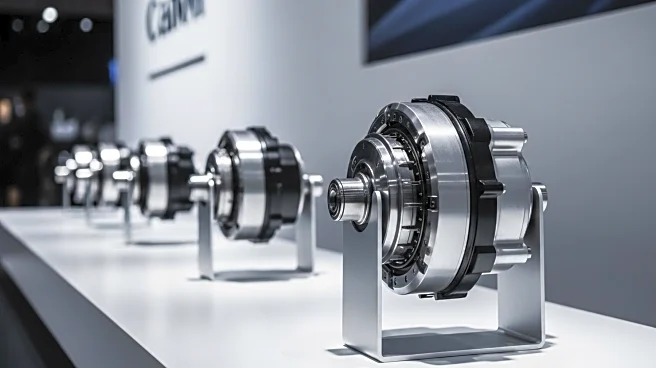What's Happening?
Protean Electric, a British company, is set to revolutionize the electric vehicle (EV) industry with its in-wheel motor technology, slated for production by 2026. This innovation involves embedding a motor directly in each wheel, eliminating the need for traditional transmission systems. The design simplifies vehicle mechanics, potentially enhancing driving dynamics and reducing production costs. Each wheel operates independently, offering improved traction and stability, especially in challenging driving conditions. Protean's in-wheel motors promise up to 300 horsepower per wheel, with integrated electronics and braking systems. An unnamed European automaker plans to adopt this technology for a high-performance electric sports car, showcasing its potential for rapid acceleration.
Why It's Important?
The introduction of in-wheel motors could significantly impact the EV market by making electric vehicles more affordable and accessible. By reducing the complexity of vehicle systems, manufacturers can streamline production processes, potentially lowering costs. This technology could accelerate the transition to sustainable transportation, offering consumers a more responsive and sporty driving experience. The economic feasibility of Protean's technology is promising, as production costs are expected to be comparable to traditional electric motors. The success of in-wheel motors could redefine electric vehicle design and affordability, making EVs more accessible to a broader audience.
What's Next?
Protean Electric aims to bring its in-wheel motors to market by 2026, with plans to deliver motors capable of producing 220 kW and 2,500 Nm of torque. As the technology matures, it could extend beyond performance vehicles to more mainstream applications. The automotive industry is closely watching Protean's progress, as the success of in-wheel motors could drive down costs and make EVs more accessible to the average consumer. The coming years will reveal whether Protean's vision can overcome technical challenges and fulfill its promise of revolutionizing the electric vehicle market.
Beyond the Headlines
In-wheel motor technology presents several technical challenges, such as managing unsprung weight and ensuring component durability. The proximity of these motors to the ground exposes them to harsh environmental conditions, necessitating robust and well-sealed components. Despite these challenges, Protean Electric is optimistic about the economic feasibility of their technology. The potential reduction in electric vehicle prices could be a game-changer, as fewer parts mean a leaner supply chain and reduced labor costs during assembly.









